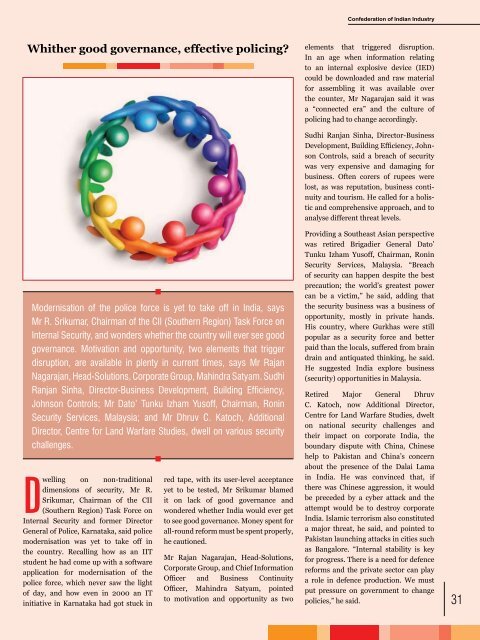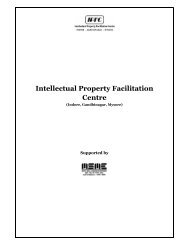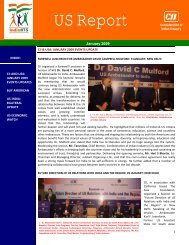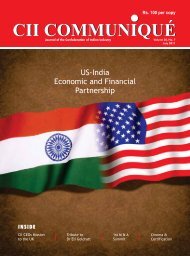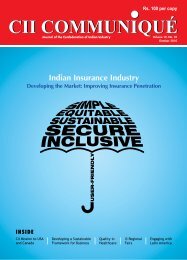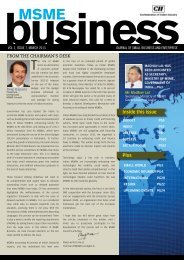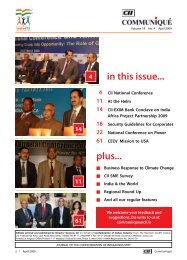30past 10 years, according to him, had seenexponential growth in the mushroomingof companies providing security and arise in the number of guards. “This isnot relevant. We must look at emergingtrends. All states respond too slowly, toolate. The onus is on us as individuals totell the state that in today’s times thereis huge technology to be garnered.” MrRaghavan was for a formal structure at astrategic level, with <strong>CII</strong> regularly meetingwith security agencies in regions andstates.Providing a perspective of 65000 peoplehaving been killed in terrorist attacksand 9000 in all warssince Independence andhow India was under a“severe” terror threat,Mr Amit Verma, Head –Corporate Strategy, HCLSecurity, said the countryneeded to constantlyupgrade security systems.“The terrorist now looksat creating maximumimpact with minimuminvestment. So youhave to raise the barby having integratedsystems (comprising ofsecurity and IT). Groundintelligence is important.Response in the firstcouple of hours is critical.Today’s prime targets,Mr Verma pointed out,were crowded places,critical infrastructure,hotels, schools and publictransport; the targets wereno longer only government institutions,politicians and VIPs.“Unless you have communication, youcannot command and control. To beable to communicate effectively at theright time is extremely important. Aprivate agency can be trusted to set upa network and run it. Multiple agenciesneed to respond in a given situation;there has to be a unified concept ofcommunication,” said Mr SubodhVardhan, Director-Sales and CountryHead, Enterprise Mobility, MotorolaIndia. He described the government radionetwork Motorola-HCL were readyingfor the Commonwealth Games in NewDelhi. The single-platform, two-wayradio network would support multiplegovernment organisations in a givengeographical area; it was a relatively newconcept in Asia. The network was notonly cost-effective and reliable; it scoredover the cellular network that usuallycollapsed when traffic exceeded a presetlimit during emergencies.Major General S.G. Chatterji, Director-General (Resettlement), Ministry ofDefence, in charge of a “pool of excellenttrained personnel”, linked the turmoil toglobalisation. Various parts of the worldwere in different stages of growth andalthough there was universal awareness,rules and regulations were not the sameeverywhere, he said. Security meantlittle without adequate economic clout,and the country had not worked out theelements of internal security properly,he added.Coming to brass-tacks and presenting ablunt portrayal of reality as it were, MsMaja Daruwala, Director, CommonwealthHuman Rights Initiative, asked, “Whosesecurity are we looking at?” “If nationalsecurity is far from people’s minds, theordinary citizen is concerned with his orher security,” she said, giving day-to-dayexamples of the security problems facedby the man on the street, the woman onher way to work at night, and the girlwho wants to get across two streets atnight but is afraid to do so, and is afraidof policemen too.“I have no great desire to epitomisedead people. Why are we allowing 1000policemen to be killed (in response to anearlier speaker)? I’d rather talk about thepoliceman who works andcomes back home to hisfamily. The police are ourlast line of defence but theyare not looked after well.Security cannot be leftto private enterprise; thestate has a responsibilityto create an environmentwhere there is rule of lawand liberty,” Ms Daruwalasaid. There was a need torevamp the police system,which according to her hadworked for the colonialistswho wanted to controlthe country. The policeforce, she said, had to beintelligence-led.“There are too manylateral loyalties, toomuch vested interest atall levels. The result isthe collapse of ‘commandand control’. The role ofthe political executivemust be defined by legislation and theoperational responsibility (management)must be with the head of police,” MsDaruwala pointed out. According toher, the police were hardly accountableand it was usually public outcry thatled to some result. She stressed thateveryday underperformance could notbe changed unless the substrata of policemanagement was looked at. “Today, eventhe public is for police reform. The ideais not to create a police state but a forcewe can trust – policing for the people.”
Whither good governance, effective policing?elements that triggered disruption.In an age when information relatingto an internal explosive device (IED)could be downloaded and raw materialfor assembling it was available overthe counter, Mr Nagarajan said it wasa “connected era” and the culture ofpolicing had to change accordingly.Modernisation of the police force is yet to take off in India, saysMr R. Srikumar, Chairman of the <strong>CII</strong> (Southern Region) Task Force onInternal Security, and wonders whether the country will ever see goodgovernance. Motivation and opportunity, two elements that triggerdisruption, are available in plenty in current times, says Mr RajanNagarajan, Head-Solutions, Corporate Group, Mahindra Satyam. SudhiRanjan Sinha, Director-Business Development, Building Efficiency,Johnson Controls; Mr Dato’ Tunku Izham Yusoff, Chairman, RoninSecurity Services, Malaysia; and Mr Dhruv C. Katoch, AdditionalDirector, Centre for Land Warfare Studies, dwell on various securitychallenges.Dwelling on non-traditionaldimensions of security, Mr R.Srikumar, Chairman of the <strong>CII</strong>(Southern Region) Task Force onInternal Security and former DirectorGeneral of Police, Karnataka, said policemodernisation was yet to take off inthe country. Recalling how as an IITstudent he had come up with a softwareapplication for modernisation of thepolice force, which never saw the lightof day, and how even in 2000 an ITinitiative in Karnataka had got stuck inred tape, with its user-level acceptanceyet to be tested, Mr Srikumar blamedit on lack of good governance andwondered whether India would ever getto see good governance. Money spent forall-round reform must be spent properly,he cautioned.Mr Rajan Nagarajan, Head-Solutions,Corporate Group, and Chief InformationOfficer and Business ContinuityOfficer, Mahindra Satyam, pointedto motivation and opportunity as twoSudhi Ranjan Sinha, Director-BusinessDevelopment, Building Efficiency, JohnsonControls, said a breach of securitywas very expensive and damaging forbusiness. Often corers of rupees werelost, as was reputation, business continuityand tourism. He called for a holisticand comprehensive approach, and toanalyse different threat levels.Providing a Southeast Asian perspectivewas retired Brigadier General Dato’Tunku Izham Yusoff, Chairman, RoninSecurity Services, Malaysia. “Breachof security can happen despite the bestprecaution; the world’s greatest powercan be a victim,” he said, adding thatthe security business was a business ofopportunity, mostly in private hands.His country, where Gurkhas were stillpopular as a security force and betterpaid than the locals, suffered from braindrain and antiquated thinking, he said.He suggested India explore business(security) opportunities in Malaysia.Retired Major General DhruvC. Katoch, now Additional Director,Centre for Land Warfare Studies, dwelton national security challenges andtheir impact on corporate India, theboundary dispute with China, Chinesehelp to Pakistan and China’s concernabout the presence of the Dalai Lamain India. He was convinced that, ifthere was Chinese aggression, it wouldbe preceded by a cyber attack and theattempt would be to destroy corporateIndia. Islamic terrorism also constituteda major threat, he said, and pointed toPakistan launching attacks in cities suchas Bangalore. “Internal stability is keyfor progress. There is a need for defencereforms and the private sector can playa role in defence production. We mustput pressure on government to changepolicies,” he said.31
- Page 1: Quarterly Newsletter from CII (Sout
- Page 5 and 6: Chairman’s Messageear Reader,It i
- Page 7 and 8: In September 2007, CII in partnersh
- Page 9 and 10: and at affordable prices, not reser
- Page 11 and 12: CII Southern Region Annual DaysAnnu
- Page 13 and 14: Kerala - Global Health Challenges -
- Page 16 and 17: TRICHY TRIVANDRUAM VIZAGVIJAYAWADAC
- Page 19 and 20: How mobile phones, micro-financehav
- Page 21 and 22: A call for good governance,transpar
- Page 23 and 24: Business Consulting Services, USA g
- Page 25: One second, one small step canmake
- Page 28 and 29: Securing Business and BeyondNo more
- Page 32 and 33: In today’s world, ‘intelligent
- Page 34 and 35: Mr Ashish Sonal, Founder & CEO, Ork
- Page 36 and 37: 36emergency response team-India) is
- Page 38 and 39: and pass the same for obtaining anI
- Page 40 and 41: Kerala Ayurveda Scenario3. Kerala,
- Page 42 and 43: Scaling Up : A few initiatives8. Va
- Page 44 and 45: CSR CornerSneham - The CSR Wing of
- Page 46 and 47: “Become a Santa” InitiativeSNEH
- Page 48 and 49: Deccan DoingsRegional, State & Zona
- Page 50 and 51: State ActivitiesAndhra PradeshSeven
- Page 52 and 53: CII - Andhra Pradesh Tata DocomoCri
- Page 54 and 55: KeralaOne-Day Attitudinal Seminar o
- Page 56 and 57: Job Opportunities Session18 April 2
- Page 58 and 59: Study Mission on Total EmployeeInvo
- Page 60 and 61: Awareness Programmeon SEDEX & C-TPA
- Page 62 and 63: CII “ERA” (EmpoweringRural Area
- Page 64 and 65: In FocusBuilding MSMEs in the Regio
- Page 66 and 67: and services, investment by small a
- Page 68 and 69: Young IndiansBANGALOREA Transformat
- Page 70: CII Southern Region NetworkSouthern


